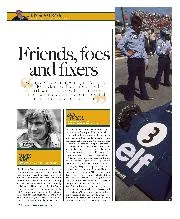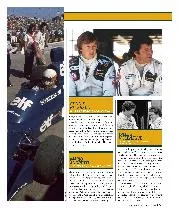Scheckter’s life was changed by a magazine advertisement. “I was in Monaco when I saw it. The ad showed a simulator of a gun shooting at a screen. I thought what a great idea, to interact with a movie. The friend I was with said the company that made it was based in England, and did I want to go and see it? I said yes.
“I thought what a great concept, but how badly it was done. A friend did some research, to see if there was a business for this idea, and said law enforcement needed something to train police how to make key decisions under pressure. I’d been thinking of the games industry, but instead I ended up going to the FBI with this idea. I thought maybe they were being polite, but they said it sounded great.”
The business that would become Firearms Training Systems, or FATS, “started on the kitchen table in a little place in Hilton Head, South Carolina. Before this, simulators were simply a friendly or unfriendly picture on a shooting range. But this was taking a movie, an actual incident that had been recreated, and using a laser detection system, so you knew exactly if you’d been accurate. We developed that, made it more sophisticated and took it to the military as well.”
Jody is telling me this as we sit in the spacious lounge of his 18th century stately home, Laverstoke House. Outside, the grounds stretch down to the wooded horizon. Beyond the trees and the river is Laverstoke Park, the 2500-acre organic farm that consumes Scheckter today. Racing didn’t buy him all of this. It was the training systems business that made him a multimillionaire. But none of it came easily.
The back story behind FATS shows just how big a step he made by quitting racing in the way he did. “I always said I went from first class to stand-by in one year,” he says. “When we went over to the States we started in a hotel that didn’t even serve breakfast. Then we lived in a small apartment in Hilton Head, then on to Atlanta. Nobody knew my background. I would go to a show to talk about my idea and while I was talking to a guy, he’d just turn around and walk away. I was there with my cashmere jacket, which in those circumstances was completely out of place.”
But his racing background stood him in good stead for life’s biggest challenge yet. “We were taking technology right to the limit and we worked very fast, both things I learnt from Fl,” he says. “Fl is the fastest in the world for that, even more than wartime. What we did was combine different technologies. They weren’t breaking new ground on their own, but we put them together to make this simulator.”
But by the early 1990s, FATS was taking its toll. “It was a massive adventure for 12 years,” he says, “in some ways as rewarding as F1, but nobody knew about it. We were in 35 different countries, we had 95 per cent of the world market and in the last three years the turnover rose from £29m to £60m to £100m. But my wife worked 13 weekends in a row. All we did was work. On a Friday you’d have half a glass of wine and fall asleep.
“At the end of those three years the shareholders said it was time to sell, because a bad year would have dropped its worth. My wife is English and she wanted to come home. So we sold it to a fund in New York that went public two months later. We were very lucky. We didn’t get it all because there were other shareholders. But we did well. ”
He won’t be pushed on specifics, but Scheckter and his family arrived back in England worth tens of millions more than when they left. But at 46, such a man wasn’t about to sit back. The question was what to do next.”

Since he stopped racing Jody has been at the helm of two businesses and made a small fortune — out of a large one
James Mitchell
“On our return I bought 530 acres and this place,” he says. “I didn’t want to go into the same business here. I didn’t know what to do. So I said to myself, ‘If I’m not doing anything else I’m going to produce the best-tasting, healthiest food for my family’.” That phrase — ‘best-tasting, healthiest food’ — should come with a trademark sign. It crops up time and again as we discuss Laverstoke. It’s the Scheckter mantra.
“I had a farm in America and my wife gave me a book on organics,” he says when asked how it started. “I suppose it became a passion. I’ve always been a ‘foodie’ and I’ve always been fit and exercised. But then you realise you can’t do it small. If you do, you can’t do it well. The farm next door came up for sale, so I bought that and now we have 2500 acres.
“I suppose I drank a lot of whisky and got a lot of ideas. It’s become a monster. I did too much. I started eight companies at once, all to do the same thing: to produce the best-tasting, healthiest food. There was a lab, a mozzarella factory, an abattoir, composting and so on. But I was playing somebody else’s game and the meat market is the worst. In cars, you bring a thousand pieces together, you make one and you sell it. In an abattoir you bring in one, then cut it into a thousand pieces. But if you don’t sell a few of those pieces you lose money because the margins are so small.






